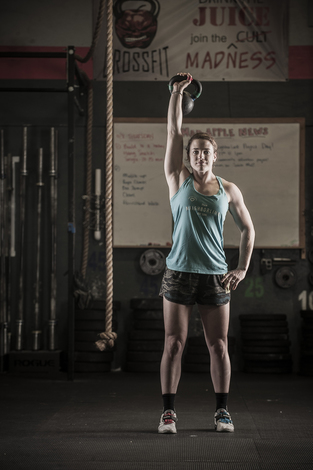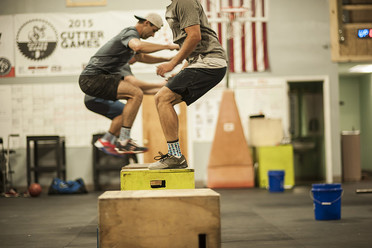
1 – You need to have experience in lifting/exercise techniques
Technique while exercising is very important. As someone who prescribes exercises, it is more important that an individual does the move correctly (consistently) before they progress the exercise to include more reps and/or weight. During all of the sessions in Newmarket the trainers instructed us on the technique and had us performing the exercises with little or even no weight beforehand while observing each of us to make sure there were no major faults. If you are new to a specific exercise, be sure to tell the trainer and ask for some tips! Don’t be shy – that is what they are there for.
2 – You have to be able to lift heavy loads
The popular videos on YouTube and Facebook show people lifting heavy weights successfully (or unsuccessfully), giving the impression that only people who can lift heavy weights do CrossFit. You would not expect to go out on a field and play soccer like Cristiano Ronaldo or swim like Michael Phelps. Nor would you be discouraged and decide not to play simply because you are aware you cannot play like them. Like any sport or activity you start at the bottom and work your way up. With experience, training, hard work, and fun you can improve – with CrossFit this may mean you start with the lightest weights and gradually work your way up as they become easier. Leave your pride at the door – start small and slowly add weights until you’re at a level that is good for you.
3 – You will get injured if you do CrossFit
Like any physical activity there is a risk of injury – this can occur if you ignore technique, lift weights that are too heavy, increase weight too fast or too soon, and most importantly if you don’t listen to your body. One of the first sessions I did, the coach recommended I strive for a lower calorie count on the rowing machine than the general recommendation. While my pride stung a bit, this was good advice – had I pushed myself too fast too soon, it is possible I would
have gone home with heat exhaustion. I used that number as a baseline for future sessions and was able to increase it (slowly) with time.

4 – The trainers know everything (mind readers?)
As with other physical activity classes, the instructors guide you through the proper form and technique to perform the exercises. Their goal is to critique and improve your form so that you perform the exercise correctly and safely. They are not, however, mind readers. This means that if something hurts or does not feel good, they will not know to make changes or adaptations unless you let them know. The instructors during my sessions were helpful in providing adaptations and variations whenever necessary. They did this when they were aware of a limitation or injury. You have to assume responsibility of your own body. The instructors should be able to help guide you through a safe workout, but not if you assume they know everything and know what you’re feeling. Don’t hesitate or feel intimidated; tell them the truth so that they can help you have a good and safe workout.
5 – All CrossFit gyms (boxes) are the same
Like any profession, like any anything – there are good and bad versions. There are CrossFit gyms that do not emphasize technique and form and CrossFit goers that do not listen to their bodies. These people are likely to injure themselves and create a negative image for the sport and other boxes.
My experience with CrossFit Newmarket Central was positive. I attribute this to a combination of things:
The coaches’ abilities to provide input on technique, form, level, and ability
My ability to listen to my body and inform coaches when something was wrong
The coaches’ ability to provide exercise adaptations and variations when needed
My ability to try new exercises and add more weight with caution
Your number one priority is protecting your body and you need to be your own health advocate! When it comes to your health and safety – don’t be shy, don’t be proud – ask for help. When it doesn’t feel right, listen to your body – don’t be intimidated – ask to be critiqued or for a variation!
Before beginning any new form of exercise, if you have any concerns or injuries, please consult a healthcare professional.

